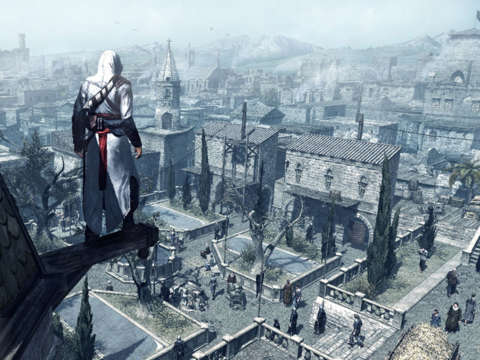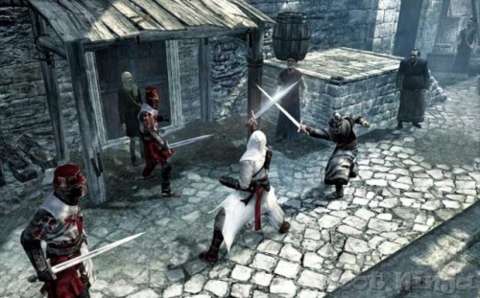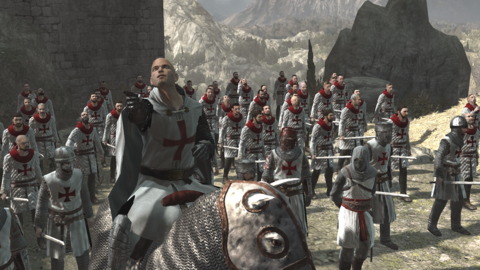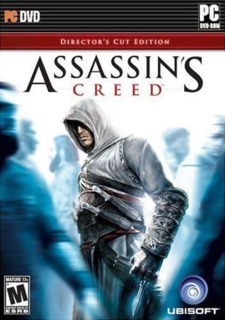
Released in 2007 and developed by Ubisoft Montreal, Assassin's Creed provides a fun adventure that is sure to stick in the minds of those who play it for years to come. It certainly has its share of faults, but with a detailed open world and satisfying open-ended gameplay, Assassin's Creed is an instant classic.
The story is about a twenty-something bartender named Desmond Miles who has been kidnapped for unknown reasons by a shady mega-corporation called Abstergo Industries, who have forced him into a machine called the Animus. This machine can read the users genetic memory, allowing one to relive his ancestors lives.

In the Animus, Desmond relives the memories of ancestor Altair Ibn-La Ahad, a cold-blooded assassin in the Holy Land in 1191, during the height of the Third Crusade. Altair is on a quest for redemption after he betrayed the Assassin Brotherhood through actions inspired by his own arrogance and naivety. According to the mentor, Altair can redeem himself by assassinating 9 key members of the Templar Order who have been getting directly involved in the Crusades. The Assassin's and Templars have been waging a deeply philosophical and secretive war for centuries.
The modern-day plot has little substance, and it doesn't really go much of anywhere. Though it does hint at setting up events for the next game, this doesn't change the fact that that it is lackluster. Desmond sections feel more like they are there just as banal intermissions between time in the Animus. In contrast, the historical plot with Altair is moderately entertaining, with good pacing and a sturdy foundation. The story is not simplistic or overly-complicated, and progresses steadily.
This progression primarily takes the form of assassinations, but it takes some work to get there. Before each assassination, Altair must synchronize with viewpoints (which are located in high areas) to reveal the map, making navigation easier and to make activities easier to locate. Through completing investigations, Altair will gain information about his current target. These mini-missions may be fun for the first couple hours, but you will quickly realize that they all follow the same basic formula, and they soon become mundane and horribly repetitive.

Fortunately, the actual assassination missions are not plagued by these same issues. They are less formulated, and more open-ended, and this allows for different methods of going about the mission. Want to go in stealthy? Go ahead. Want to go in sword at the ready for bloody combat? Sure. Each of the nine assassination missions are unique, with distinctive designs. Just as distinct are the Templars themselves, with each one having his own motives and goals within their respective cities.
Other side-activities include the "Save Scholars" mini-missions, where Altair can save a group of scholars from over-aggressive soldiers. The scholars can then be used to blend with, if the need arises. There is also flag collecting, which is mostly pointless. Flags are random collectible items scattered across the cities.
The cities are dense and detailed, capturing the sense of the middle-ages quite well. Merchants run the markets, crowds walk the plazas, and soldiers patrol the streets. Each of the three cities feels unique, with their own atmospheres and tones. From the dreary, grimy, war-torn streets of Acre, to the majestic architecture of Jerusalem, to the tight streets of Damascus, each city feels distinct. Another location is the imposing Assassin Fortress of Masyaf and its surrounding village.
And then there is the vast and rural Kingdom. The Kingdom is composed mostly of villages and scattered soldier outposts, separated by empty countryside. The Kingdom feels like wasted space and wasted potential, as no missions take place here, and it feels like its only use is for flag collecting and as a gap between cities. Navigation is also a chore, as the Kingdom is poorly layed-out.

Each location has its own soundtrack, which adds to the unique strengths of each. The West-Asian inspired soundtrack fits the setting perfectly, and it grips the atmospheric tones firmly. From the harmonic tones of Jerusalem, to the dark accents of Acre, it feels varied.
The Verdict_
Assassin's Creedis a game that avid open-world sandbox fans will find enjoyment in, and it has quite a bit to offer. It has a likable and well paced historical story, marvelous cities and art design, satisfying assassination missions, and a fitting soundtrack. It is unfortunate that it is marred by a very repetitive gameplay design, a one-dimensional modern-story, and that the side-activities are pointless and mundane. Assassin's Creed is a good game that has a lot of potential, but it has a lot to determine about itself before it can be something truly amazing.
The Positive
+ Likable historical story
+ Gratifying assassination missions
+ Remarkable cities and art design
+ Fitting soundtrack
The Negative
- Painfully repetitious gameplay
- A flimsy modern-day story
- Mundane side-activities

